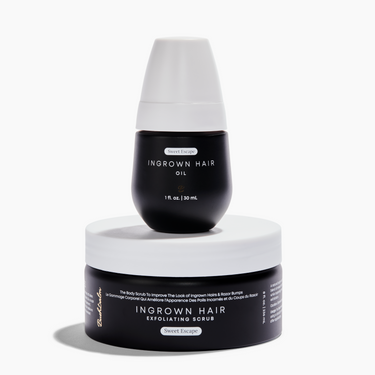Everything You Need To Know About PCOS
One in 10 women of childbearing age is affected by PCOS. One of the most common symptoms of PCOS includes experiencing excess hair growth. If you are reading this article, there is a good chance you know someone dealing with PCOS. This blog will do a deep dive on PCOS and more.
What is PCOS
What causes PCOS
Unfortunately there is no exact cause of what causes PCOS in women. A few factors that may contribute to a PCOS diagnosis include:
Heredity
Over the years, research suggests that certain genes might be linked to PCOS. If you have a family history of PCOS, it may play a role in developing the disorder.
Excess androgen
If you have PCOS, your ovaries may produce high levels of androgen which interferes with ovulation. This means that eggs don't develop on a regular basis and aren't released from the follicles where they develop. Excess androgen can also result in hirsutism (excess body hair growth) and acne.
What are the first signs of PCOS
One of the first and most common signs of PCOS include having irregular periods. This could look like skipping periods, having longer than usual periods, or having difficulty getting pregnant. Another sign you may experience at first may result in excess facial and body hair, also known as hirstuism. This is caused by having too much androgen, which is the hormone responsible for any excess hair growth.
Having few menstrual periods or having periods that aren't regular are common signs of PCOS. So is having periods that last for many days or longer than is typical for a period. For example, you might have fewer than nine periods a year. And those periods may occur more than 35 days apart. You may have trouble getting pregnant.

Common PCOS Symptoms
Common symptoms of PCOS include: darkened skin on the neck, groin, underarms or skin folds, as well as excessive hair growth in androgen-sensitive areas like face, breasts, lower back.

How to test for PCOS
To test for PCOS you will first need to consult with your doctor. From there they may recommend a pelvic exam and/or an ultrasound to check on your reproductive organs for any masses or growths. A doctor may also ask you to do blood tests to measure hormone levels.

How to cure PCOS permanently
Unfortunately, PCOS cannot be cured, but the symptoms can be managed. There are treatment options available, however they vary because not all those with PCOS experience the same range of symptoms. If you are looking for treatment options to help with PCOS you should speak with your doctor.
How to treat excess hair growth caused by PCOS
Many women who experience PCOS and excess hair growth on their face choose to remove the body hair most commonly with a razor. “PCOS causes excessive hair growth on my face. I've learned the hard way that a routine is essential if I want to avoid ingrown hairs and razor burn. This is the best routine for literally any area you shave and not have to deal with the aftermath” - said Meg Boggs, Author and Mother.

Exfoliating before shaving is a must. Exfoliating the skin helps to remove dirt and dead skin cells which keeps your skin clean, and unclogs pores leading to a smoother shave, more painless shave. After your shave be sure to oil and moisturize the skin. By applying 2-3 pumps of oil, you are helping to seal in moisture and protect skin from irritation, ingrown hairs, and razor burn. You should also use an oil that can help soften body hair over time, as it may become coarse with shaving.
If you or someone you know feels they may be experiencing PCOS symptoms, please contact your doctor to discuss.

























